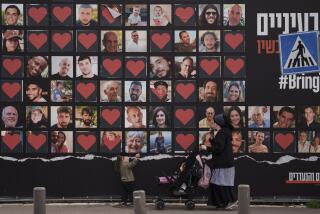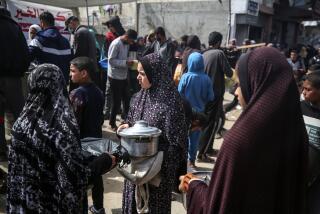Cash Payment to Serb Rebels Fails to Aid U.N.
- Share via
ZAGREB, Croatia — The United Nations has paid $49,000 in cash to Serbian rebels in northern Bosnia-Herzegovina in an unsuccessful attempt to remove barriers to deployment of peacekeeping troops to the volatile area, U.N. sources disclosed Friday.
Despite the payment to Banja Luka officials, the 1,000-strong Canadian battalion has not been able to relocate to the Serb-held city from its base in the central Croatian town of Lipik.
Canadian officers, who have sent delegations to the Banja Luka city limits each morning for the past two weeks, told journalists that they believe their deployment has been thwarted deliberately so that “ethnic cleansing” operations--the forcible removal of non-Serbs from Serb-controlled areas--can continue without the prying eyes of foreign observers.
Non-Serbs continue to be systematically routed from the area around Banja Luka. It is home to one of the most militant factions of the Bosnian Serb forces, which have been waging a deadly campaign against the republic’s declared independence since March.
The Canadian battalion has been assigned to Banja Luka as part of a 6,000-troop expansion of peacekeeping operations in Bosnia approved by the United Nations two months ago.
An advance party of Canadians first attempted to prepare quarters for the rest of the troops two weeks ago. But representatives of Banja Luka’s mayor told them they could not enter the region until a $250,000 “security deposit” was paid to defray any costs incurred by the city as a result of the peacekeepers’ stay.
A Canadian officer in Lipik said that $49,000 in U.S. currency was delivered in a suitcase by Canadian forces to the Banja Luka mayor’s staff on Monday. Croatia’s state-run HINA news agency also reported a payment had been made, without giving the amount.
The payment has been explained by U.N. officials as compensation to Banja Luka for construction and renovation work reportedly ordered last spring by Finnish troops. Banja Luka was to have hosted a logistics center for the U.N. mission in Croatia. But the deteriorating security situation in the city prompted the United Nations to relocate the center to Zagreb within a few weeks of its designation.
Under the deployment plan, host municipalities were supposed to bear much of the cost of accommodating the peacekeepers.
Western diplomats described the payment request as thinly disguised extortion. They warned that giving cash to guerrilla forces ruling Banja Luka could set a dangerous precedent and encourage other fighters to make similar demands of the peacekeepers.
The Canadian officers said that they had advised against the payoff and that their government was vehemently opposed. But an Ottawa official in Zagreb replied “no comment” when asked how his government viewed the payment.
U.N. mission spokeswoman Shannon Boyd confirmed that the bill, which she described as a “small administrative matter,” had been paid. She said she had no details and could not explain why the peacekeepers still could not be deployed.
“Along with the military questions involved in this deployment was the administrative element that to my knowledge has been sorted out. We fully expect the Canadian battalion to arrive this weekend and complete its deployment,” Boyd said, suggesting that the peacekeepers were not yet ready to move to Banja Luka.
But Brig. Gen. Carlos Zabala, commander of the U.N.-protected area encompassing Lipik, contradicted that argument, confirming that the Bosnia-bound Canadians were ready and waiting only for permission to deploy.
Serbian rebels have become increasingly assertive in recent weeks in claiming the right to decide security and administrative matters for the territory they have conquered in both Croatia and Bosnia. By demanding equal status with the legitimate governments of Croatia, Bosnia and Yugoslavia, the rebels claiming to rule a new entity they call the Republic of Serbian Krajina have repeatedly frustrated the U.N. peacekeeping mission, which now exceeds 20,000 troops.
The Krajina Serbs were not a party to the U.N. deployment plan drafted by envoy Cyrus R. Vance, a former U.S. secretary of state, a year ago because the Krajina was then part of Croatia.
Besides the blocked Canadian deployment, the U.N. mission has suffered other setbacks this week. Boyd described Sector South, around the self-styled Krajina capital of Knin, as an area of “a lot of tension, growing tension . . . enduring acts of petty terrorism.”
Also, U.N.-mediated talks between Croatian and Serbian leaders over living conditions in Krajina have been suspended for “an indefinite period of reflection” because they were making no progress, Boyd said.
Krajina means “military frontier” and takes its name from the Austro-Hungarian borderland where Serbs were encouraged for centuries to settle and defend the empire from the Ottoman Turks.
More to Read
Sign up for Essential California
The most important California stories and recommendations in your inbox every morning.
You may occasionally receive promotional content from the Los Angeles Times.














